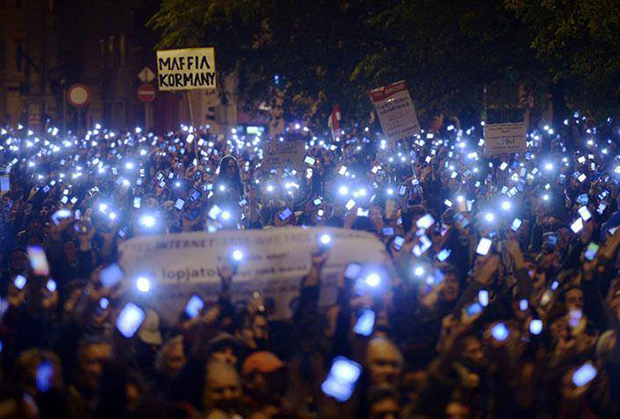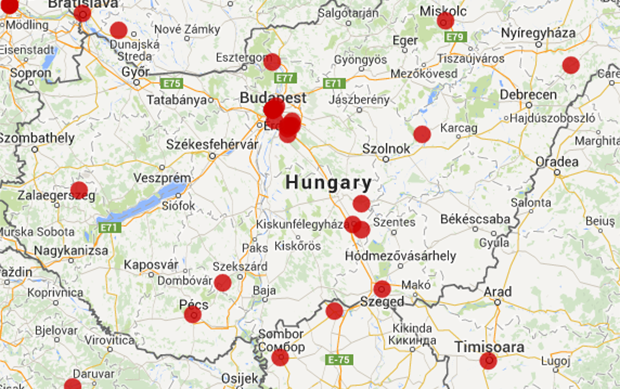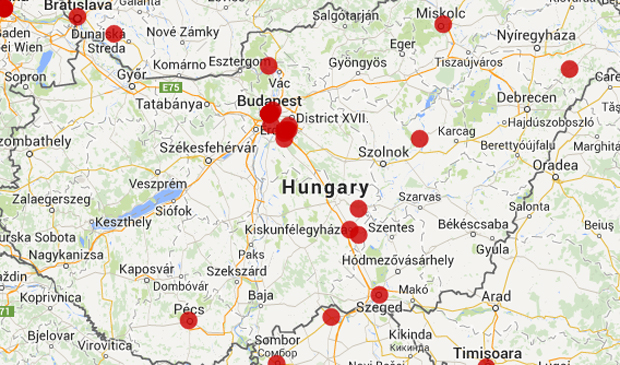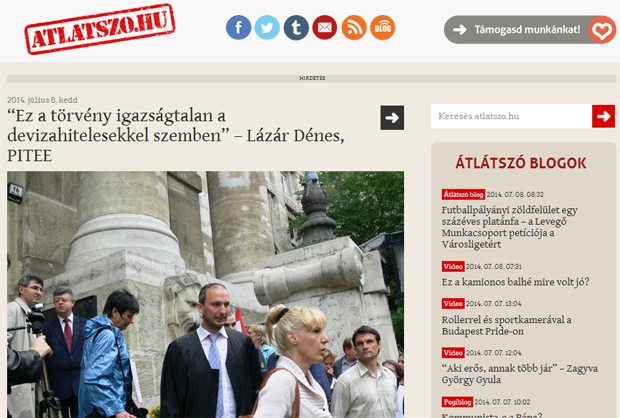28 Oct 2014 | Digital Freedom, European Union, Hungary, Mapping Media Freedom, News

Hungarians gathered in Budapest on Sunday to protest plans to introduce a tax on internet bandwidth. (Photo: 100,000 Against the Internet Tax /Facebook)
Barring a u-turn from the Hungarian government, demonstrators will return to the streets of Budapest this afternoon to oppose Prime Minster Viktor Orban’s plans to tax the internet
The draft law proposed by Orban’s government would levy a fee of 150 forints (£0.40; €0.50; $0.60) per gigabyte of data traffic. In the face of public outrage, ruling party Fidesz promised that the tax will be capped at 700 forints for consumers and 5,000 forints for businesses. However, this did not calm the angry protesters.
Sunday’s rally that drew thousands of people to the Hungarian captial’s city center. The peaceful protest became heated when some demonstrators marched to the Fidesz headquarters, and broke the windows of the building with old computers and peripherals.
This protest was arguably the largest anti-government demonstration since 2010, when Viktor Orban came to power. In contrast with other protests, the gatherings denouncing the internet tax were not organized by the weak, discredited and fragmented opposition.
According to the Hungarian media, the new tax was Viktor Orban’s own brainchild. He did not consult with his staff or the members of his government. The prime minister plans to use the money to raise the salaries of policemen and other employees of the interior ministry.
According to official estimates, the new tax will bring into the budget about 20 billion forints annually. While the Hungarian government is saying that the companies will pay the new tax, consumers fear that in the end the costs will be pushed onto their bills. The Association of IT, Telecommunications and Electronics Companies has already said the tax would force them to raise prices.
The protests are likely to continue because Hungarians realise this is more than just another tax. Many fear that the new tax will restrict access to information, put another burden on already impoverished small businesses and act as a curb on freedom of expression. It will also be a leash on young people who mainly use online media and who tend to be critical towards the government.
“The move… follows a wave of alarming anti-democratic measures by Orban that is pushing Hungary even further adrift from Europe,” the organisers of the Facebook group 100,000 against the internet tax said in a press release. “The measure would impede equal access to the internet, deepening the digital divide between Hungary’s lower economic groups and limiting internet access for cash-poor schools and universities,” they added. The group has drawn more than 200,000 likes.
Moreover, many people believe the plan of the tax is just a way to direct the public’s attention away from the US visa ban scandal. Recently Washington banned six Hungarian state officials from entering the United States, because of their alleged involvement in high-level corruption.
This is an unprecedented step towards a country that is member of the EU and NATO, and signals a low point between the relations of Hungary and the United States.
The tax didn’t go unnoticed in Brussels either. Neelie Kroes, vice president of the European Commission responsible for the Digital Agenda for Europe tweeted that it was “a shame for users and a shame for the Hungarian government”. Her spokesperson, Ryan Heath also criticized the tax in harsh terms during an EU Commission press briefing.
The internet tax is just another in a series of “special taxes” the Orban government introduced in the last couple of years to be able to keep the budget deficit in check. Retail, banking and energy sectors, as well as telecommunications providers are required to pay extra taxes. At the same time, the Hungarian government lowered the personal income taxes and subsidises the price of electricity and water.

Community radio application rejected
Deputy prime minister labels investigative journalists “traitors”
Police raided the offices of NGOs, seized documents
See all media violation reports from Hungary
This article was posted on 28 October 2014 at indexoncensorship.org
30 Sep 2014 | Hungary

Hungarian Police © Paul Appleyard/CreativeCommons/Flickr
Photographs revealing the identity of police officers can now legally be published in Hungary.
A recent ruling of the Hungarian Constitutional Court means that news organisations can now publish unaltered photographs showing the faces of police officers without gaining prior consent
Since 2007, the Hungarian Judicial System considered the personal privacy of police officers to hold greater importance than them being published in the public interest.
Hungarian journalists regularly masked the faces of the police, or manipulated the image so that the officers could not be identified.
The Constitutional Court ruled that if the photograph is taken in a public place, shows the subject in an unbiased manner, and there is clear public interest involved in distributing the picture, then it can be published without the consent of the officer.
26 Sep 2014 | Hungary, News, Politics and Society, Religion and Culture

Prime Minister Viktor Orbán (Pic © European People’s Party/CreativeCommons/Flickr)
People “working together with foreign intelligence services” have been labelled “traitors” by Hungarian Deputy Prime Minister Zsolt Semjen. The comment comes after news site index.hu published a series of investigations exposing how Ukrainians and Russians are using fraudulent techniques to get Hungarian citizenship, and then travelling in Europe with Hungarian passports. The incident follows a spate of cases of government censorship and intimidation over the past year, tracked by Index on Censorship‘s media freedom mapping project.
Earlier this month, two Hungarian non-governmental organisations (NGOs) who received money from the Norwegian government under a 20-year-old deal to help strengthen civil society in the poorer parts of Europe, were raided by police officers from the National Bureau of Investigation.
Ökotárs and Demnet are just two NGOs who have recently come under attack in Hungary. A government “blacklist” of the 13 “most wanted” organisations was leaked in May. The total number of groups under investigation is at 58 and growing, and includes human rights and watchdog organisations like the Roma Press Centre, Labrisz Lesbian Association and Hungarian Civil Liberties Union (HCLU).
A campaign has been launched by a group of Hungarian volunteers through the site Blacklisted Hungarians, encouraging the international community to show their support for the case on social media by using the hashtag #ListMeToo to share content and media coverage.
In addition to this, rapper László Pityinger, known as Dopeman, is at the centre of an ongoing criminal investigation, after he kicked the detached head of a statue symbolising the Hungarian Prime Minister Viktor Orbán. The rapper spoke at a demonstration arranged by political group Szolidaritás last October, during which the audience toppled and decapitated the statue.
He will be represented by HCLU. Dalma Dojcsák, the group’s political liberties program officer and freedom of speech expert, told Index they are trying to convince the police that Pityinger has not committed a crime.
“The police officer conducting the investigation implied that they think the same, but the prosecutors may force the case through the system until it gets to trial. We don’t know if it is going to happen,” Dojcsák said.
“In Hungary, prior, direct censorship is rare — it only happens in public service media that is ruled by the government. However, self-censorship is common among journalists, out of fear of legal procedures and losing state financed advertisement,” she added.

Deputy editor-in-chief fired from Nepszava daily
Two official bulletins appear in Kiskunfelegyhaza
28 journalists laid off by daily newspaper
Parliament speaker attempts to block interview from airing on Polish TV
Song with political reference cut from public broadcast
More reports from Hungary via mediafreedom.ushahidi.com
This article was posted on 26 September 2014 at indexoncensorship.org
24 Jul 2014 | Hungary, Mapping Media Freedom, News, Politics and Society

Hungarian NGOs are facing a rough summer: The Government Control Office (KEHI) has launched a series of investigations into grants they received from the Norway Financial Mechanism. Now the Council of Europe’s Commissioner for Human Rights, Nils Muižnieks, has written to János Lázár, Minister of the Prime Minister’s Office to express concern over the situation.
In the letter, Muižnieks told Lázár that he had been informed by several parties that audits were being conducted over the grants. A forthcoming report will further detail the monitoring that Muižnieks was conducting around media freedom in the country. For his part, Lázár has responded to the letter from the COE commissioner.
As Index reported on July 8, the government controls come after a long smear campaign with members of the Fidesz government accusing these NGOs to be proxies for “foreign interests”, and that Norway is using the program to exert direct political influence on Hungary.
“There is panic and uncertainty in the Hungarian civil society. In this respect, the controls are very effective, even if there will be no consequences,” says Tamas Bodoky, editor-in-chief of Atlatszo.hu, an investigative journalism outlet also targeted by the KEHI audit.
Atlatszo.hu decided not to comply with the government inspection, regarding it as unlawful. They say that KEHI is an agency overseeing government financial matters, and does not have the authority to investigate financing for NGOs. However, they have nothing to hide, so they published all relevant records concerning the use of funds on the website of their partner organisation, Asimov Foundation.
A number of NGOs followed Atlatszo’s example, but it is unclear what the repercussions of this decision might be. According to Bodoky, KEHI could freeze their bank accounts, suspend their VAT number, and fine them as well.
It is difficult to portray these NGOs as strongly opposing the Fidesz rule. Some of the organisations receiving grants from the Norway Financial Mechanism have been involved in anti-government protests, but others have fruitful cooperation with the government. The vast majority of grant recipients have no political involvement at all.
Bodoky believes the government controls are a small-time retaliation for the decision of the Norwegian government to suspend the payments from the EEA and Norway Grants. This fund represents the financial contribution of Norway, Iceland and Liechtenstein towards reducing economic and social disparities in the European Economic Area (EEA).
Hungary was set to receive 20 billion euros in the 2014-2020 period from this fund. However, the Hungarian government recently made important changes to the system by which EU and Norway development grants are administered. They did not consult with the donors. As a result the Norwegian government suspended the payments.
This measure did not affect the considerably smaller NGO Fund, operated by a Hungarian consortium of NGOs. The overall objective of this fund is to “strengthen civil society development and enhance contribution to social justice, democracy and sustainable development”.
The programme focuses on projects dealing with the human rights of minorities, good governance, combating racism and xenophobia, combating discrimination, social exclusion, gender inequalities and gender-based violence.
Some members of the NGOs administering the fund appear to have links to Politics Can Be Different (LMP), a small liberal party. Apparently this was the reason why State Secretary Janos Lazar, the “strong man” of the Fidesz government decided to write an open letter to the official representative of the Fund’s donors, Vidar Helgesen, Norway’s Minister of EEA and EU Affairs, accusing the Norway government of intervention into the internal affairs of Hungary.
Deputy State Secretary Nandor Csepreghy said in an interview that the Hungarian government would prefer Norway’s Civil Fund to provide financial support through the Hungarian government, whose “legitimacy comes from society and the voters”. Csepreghy believes that any other scheme can be interpreted as a direct involvement into Hungary’s internal political affairs.
Recent reports from mediafreedom.ushahidi.com:
Hungary: Companies owned by local council abrogate advertising contracts
Hungary: Investigative journalism group says it will not comply with government audit
Hungary: Officials target RTL Klub after critical reports
Hungary: NGO with close ties to Hungarian government will ‘monitor’ media attacks
Hungary: Blogger resigns after political pressure
This article was posted on July 8, 2014 at indexoncensorship.org






